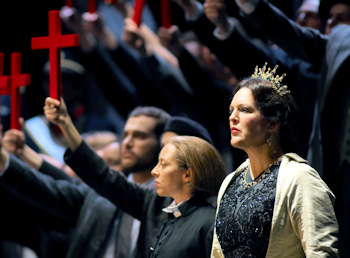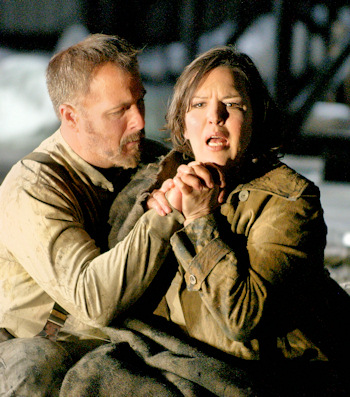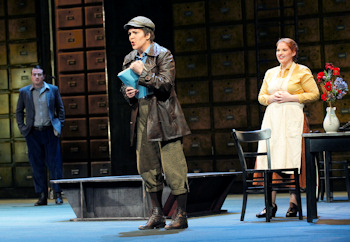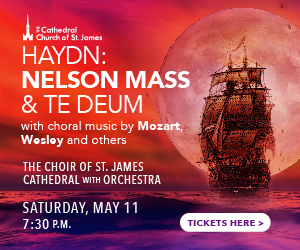There’s an audio clip on Adrianne Pieczonka’s website of her singing Richard Strauss’ Morgen. It was recorded at a recital she gave at Roy Thomson Hall in 2001. After the applause, she tells the audience, “I haven’t lived in this country since 1988. I’ve lived in Austria, and I live now in the United Kingdom - and I still say, ‘I’m going home,’ and mean Canada. You just can’t take the Canada out of the girl, I guess.”
At that time, she had no thought of moving back to Canada. Even when she sang Sieglinde in Wagner’s Die Walküre with the Canadian Opera Company three years later, she was still happily living in London. But by the time she sang the role again as part of the Ring Cycle which opened the COC’s new home in the Four Seasons Centre in 2006, she had moved back to Toronto.
She left Canada as a promising young soprano hoping to establish a career. Now, after almost two decades living in Europe, she returned as a star in major operatic centres like Munich, Bayreuth, Dresden, Vienna, Salzburg, Zurich, Milan, New York, Los Angeles and San Francisco.
Pieczonka sang Mimì in La Bohème with the COC in 1994, but it wasn’t until her first recital in Roy Thomson Hall seven years later that Toronto audiences really became aware of her, responding to her distinctive radiance and clarity. Along with Die Walküre, a second recital at Roy Thomson Hall in 2006 and her recent performances in Beethoven’s Fidelio with the COC have made her a Toronto audience favourite. I spoke with her at her home, a lovely Victorian in Toronto’s Annex neighbourhood, on the day before the final performance of Fidelio.

I settled down at a long table in Pieczonka’s kitchen while she made coffee. Her partner, Laura Tucker, came in and she introduced me. “Laura is a singer,” she said, “a mezzo”. “That’s probably the only way it would work,” Tucker said, laughing. “Exactly,” says Pieczonka, as Tucker went off to mind their three-year old daughter Grace, who was home sick from nursery school. “I can’t think of any same voice-type partnerships, although there probably are”
Do you ever get a chance to sing together?
We just did a concert in Hamilton together. It was a great program, so I hope we can get more mileage out of it. It will be good to do in Toronto.
With all the financial problems and cut-backs happening, have you had anything cancelled?
No, but I know a lot of people that have. If someone does cancel, you just have to accept it, even if you have a signed contract. But sometimes I think if something got cancelled I would be happy to have the time off. Tomorrow is my tenth performance of this Fidelio. Then next week I leave for Munich to do Otello. So if I got a call saying something was cancelled, I’d say, “Great – we’re on holiday! Let’s go down to Florida.” Sometimes my fantasy is that something will get cancelled to allow me a bit of a break.
Your schedule certainly is packed. Do you like being able to work in the city where you’re living?
Having a company like the COC here is a real bonus. It’s great to know that I’ll have at least two months at home each year. I’ve been home for quite a while, and it will be painful to get those suitcases out.
Does your family travel with you?
I love having Laura and Grace with me. Laura loves Europe and Grace is a great traveller. The kid has a pretty full passport already. After Munich, Laura and Grace will join me in Vienna – I’m doing Arabella at the Vienna State Opera. Then we’ll all be in San Francisco for May and June. I’ll sing Tosca. Laura is from northern California so that’s nice for her. But we don’t want to pull Grace out of school all the time. Some singers home-school their kids, but I feel a child needs stability and routine.
Did you know the new director of the COC before he came here?
I didn’t meet Alexander Neef until we started rehearsing Fidelio just after Christmas. But we have talked about what I would sing here, and how to make it work. I’ll miss out next season, but after that I’m here for the next three seasons.
Did doing the Ring Cycle here with Richard Bradshaw have anything to do with you returning?
Singing Die Walküre here with Richard the first time in 2004 was really important for me. It was before I decided to move home, and it created some interest. I was pleased to sing at the opening gala concert of the Four Seasons Centre, before the Ring. But then Richard died so suddenly…. He was supposed to conduct me in Don Carlos, so it was nice to be able to sing at his memorial.
Why did you move back?
The decision to move to Toronto was definitely based on where to raise our child. It all happened very quickly, meeting Laura, then having Grace. I was living in London at the time.
Why had you moved to London from Vienna?
I had lived in Vienna for six years, but I was tired of the politics. I wanted to live in an English-speaking country and I just wanted a change. I was a member of the ensemble in Vienna, and I knew I had to go freelance. I chose London because I had a lot of friends there and it is an exciting city - I love London.
But it was weird that while I lived in London I didn’t have much work there. I still worked mainly on the continent. When I moved there I was with a London agent, and I had sung at Glyndebourne and Covent Garden. But then I switched agents, and the work in London dried up. So I was leaving London to work. It didn’t make much sense. It so often happens to singers that for some reason they don’t sing where they live. I don’t want that to happen to me here
Is there anything you miss, living here?
The weather does get me down. I forgot how brutal the Canadian winters are. I am looking forward to going back to Europe, because I love those cultural centres like Vienna, Munich and London. But returning to Canada was the right choice, so I don’t regret it at all. Canada has welcomed me.
You were gone a long time.
Eighteen years. I’m no spring chicken!
Are you giving up anything living in Canada?
I don’t think I’m missing out on anything. I have an established career, so it certainly can’t harm me professionally. My presence is still strong in Europe, and I am still singing there a lot. I don’t want my career to be just in North America. I want to keep my presence up on both sides of the ocean.
Is that tricky to pull off?
It’s interesting to try to think of singers who are equally known in Europe and North America. It is really hard to maintain a strong career in both places – except for megastars like Placido Domingo.
You have worked with him a lot.
I’m singing with him at the Met in a couple of months doing Die Walküre, and next year we’ll do Simon Boccanegra there. That is going to be very exciting because he will sing a baritone role. Domingo is in a class of his own. I turned on the radio on Saturday and he was singing Adriana Lecouvreur from the Met. They said he had first done that role 40 years ago. His voice sounds so fresh.
I am a huge admirer of his, and not just for his singing. The way he runs Los Angeles Opera, he is passionate about that company, and has even taken a fee reduction. He is the sweetest man, the most generous colleague – he really is a gentleman. You meet a lot of people in this business, some are charming and some are less charming. But I find the really great talents are kind people. They’re not the ones having the diva fits and pulling huffs. That’s for egos that are not intact
What’s it like to work with Domingo?
It’s a real thrill. Some singers check out. They do their bit and then when you’re singing, they’re not there - they’re just thinking about their own voice. But he’s on, even when he’s not singing.
I’ve done quite a bit with him on stage. He conducted me in Vienna in Carmen and Tales of Hoffman when I was a complete unknown and he was just getting into conducting. It was scary to have this great star conducting me. But he was so encouraging. He’s always there for you.
Speaking of tenors, had you worked with Richard Margison before Fidelio?
I had never sung with Richard. We had sung at the same gala, but not together. I’m really enjoying singing with him, and hanging out with him. He helped us out when he stepped in to this production with just one day’s rehearsal.
You have a new recording of Lohengrin coming out - have you performed it on stage with that cast?
No, but I’ve worked with all the principals. The Lohengrin, Johan Botha will be my Otello in Munich in a couple of weeks. I got called in on that recording at the 11th hour. The original soprano had had a problem with the conductor. I had just finished my last Tosca in Los Angeles, so I flew to Cologne and jumped into Elsa’s shoes. It was gruelling because I was often singing to playback. But it came out well.
You sang Lohengrin in Götz Friedrich’s production Munich ten years ago. I see they’re doing a new production now with Jonas Kaufmann and Anja Harteros.
This is a much more lyric casting of Wagner than when Peter Seifert and Waltraud Meier sang it with me. But we are going to do this opera together again in the 2011 Munich Summer Festival. So it will be us oldies coming back to do the new production.
Have you managed to escape the heavy pressure young stars are exposed to unscathed?
There are a lot of singers my age who are no longer in the business. They have taken things too fast and burned out. I’m still here. I feel that I’m coming into my glory years. These are my years for the great Tosca’s and other big roles that, with good technique and a lot of hard work, I will continue to keep doing.
Are there too many unrealistic demands placed on singers today?
We are expected to look fantastic on stage and do glamorous photo shoots. All that tires me out. It’s not me, anyways. I’m not into what they call in Germany the ‘schickimicki’, the parties and champagne receptions. I like to drink and go out with my friends. But I can’t do all the public relations stuff. I do a little bit, but the amount these megastars are doing is daunting to me.
What about a singer like Edita Guberova, who is still taking on new roles and singing so beautifully at sixty-two. I know you have worked with her a lot.

In fact Edita is having a big premiere tonight in Lucrezia Borgia in Munich. I am a friend of hers, and she sets an example for me - to be singing with that technique at her age. We are going to Tokyo to do Ariadne auf Naxos again. It’s a real thrill for me to work with her. They adore her in Europe, and she’s a huge star in Japan. But if she came to Roy Thomson Hall .... She never had success at the Met, and she didn’t like New York. She’s a very down to earth woman who likes her quiet time. But she is determined – when she wasn’t getting recordings, she started her own company, Nightingale. I’m full of admiration. I know at Lucrezia tonight in Munich they will clap for her for probably half an hour.
I’ve never experienced anything like the clapping and foot-stomping - and the extended curtain calls - in Munich, especially for Gruberova. We never do anything like that here. In fact, at the performance of Fidelio I saw last week the curtain started coming down while you were all still bowing.
That’s the one thing about the Canadian Opera Company. After a performance the audience claps, we bow twice and they then bring the curtain down. In Europe they really show their appreciation. And if they don’t like something they will boo. I like that, because it’s demonstrative, and that’s exciting for a performer. I really felt that excitement here in the Ring. People cheered and bravoed - that was great.
Fidelio is a new role for you – do you enjoy singing it?
Yes, but it’s a taxing sing. Beethoven is not one of my favourite composers. For me, Beethoven was not an opera composer. He treats the voice like a clarinet or French horn or something, and it’s uncomfortable. Even Beethoven’s Ninth Symphony - I do it, but it’s not a pleasant sing.
At least in the Ninth the vocal part is short.
It’s short, but I’m thinking technically a lot of the time. I’ve grown to like it more than I ever thought I would, because for me it has a lot of Mozart moments, which I love. So I approach it as a beefy Donna Anna with extra dramatic stuff. A lot of singers try to muscle through this role, but then you’re lost. It has to be done like a laser or a trumpet,
Have you done many pants role? No, I’ve never played a pants role before. Laura, as a mezzo, has played them her whole career. But this is the only pants role I will ever get to play. It’s very compelling dramatically because the character I play has a double life, and that has been very challenging. I love playing the boy. It’s been fun to slip into that Oliver Twist costume and the short-hair wig. It is freeing - I can flounce round and be boyish.
What were you like as a kid?
I was a tomboy - totally.
Did you sing?
I did. I was artistic, but I was also very athletic. I loved sports and played them all. But I also did voice lessons. I can remember having to cut out of basketball practice early, and the other girls would say, “Singing lessons? How weird!” and they would giggle.
Were your parents interested in music?
They were, though not opera. They listened to popular music – singers like Frank Sinatra, musicals and light pops. But we all subscribed to the Hamilton Philharmonic concerts. Now my parents love opera, and that’s great. They have become opera fans through following my career.
How did you end up in opera?
I discovered opera on my own - you often find that with singers. I just liked to sing. One of my teachers said, “That’s quite a voice you have,” and led me towards the classical side.
I was a ham. I liked doing everything, not just singing. I just wanted to be on stage, so I was in musicals and plays from an early age. My idol was Julie Andrews, but I loved the Sonny and Cher show, and I adored Carol Burnett. I wrote to her and said, “I want to be like you”. She wrote back - well, it was probably her publicist – telling me I should go to university. And it was in university that I discovered the Met broadcasts and the whole opera scene.
Do you feel a need to be on stage?
Yes, it’s a powerful drug being on stage. I think that’s why singers like Placido and Edita can’t stop, even though they could comfortably retire. Something compels them to keep doing it. It’s their lifeblood. But then there are singers who sing past their sell-by date - maybe they have developed a wobble, or the power of their voice has diminished. I hope I’m never one of them. I will be happy to retire, because I want to teach. Like Joan Sutherland, I want to go out with a bang - at my peak.
For a soprano who does the big dramatic roles, your voice is remarkably light and clear, and your vibrato is so fast.
It takes a lot of work. If my vibrato ever got unfast I would worry about it.

In our recital Laura and I sang some Purcell duets. In the past a lot of singers with these big voices like Maureen Forrester would open recital with a Handel aria. Jon Vickers loved to do that - and why not? I guess today they sound old-fashioned.
Do you enjoy Handel?
I do. If I just want to chill out I listen to Handel, or Bach. Those are for me the meditative composers. That’s pure, fine music, and it’s cleansing for me. I just love it. So I enjoy Tafelmusik, and they’re just around the corner. It would be great to sing with them.
Are there any Handel opera roles you would like to do?
It’s my fantasy to do Alcina. But I think my voice is maybe one number too heavy. Coloratura is not my forte. I do have to do it in some roles, and I try to manage it as best I can.
There were splendid passages in your Fidelio.
Those little bits were challenging. I think my voice is most suited to long stretching lines. That’s why I love Richard Strauss so much.
You sing so many different types of parts and composers. Even if you’re not singing Bellini
But I did! Laura and I did a big sections of Norma in our recital in Hamilton. I did ‘Casta diva’, and then we did ‘Mira, o Norma’. It was wonderful, and Laura is a great Adalgisa. I actually contemplated doing Norma when I was asked to record it. I had to think long and hard. If I had a year or even six months to devote myself to it, it could be possible. But my schedule doesn’t allow me the time to fine-tune and perfect it.
What roles are you asked to do that you would never?
I wouldn’t do Brünnhilde or Isolde. And Turandot – forget it. You need a lot of heft for those big climaxes in ‘In questa reggia’. It’s gorgeous music, and it goes right to the heart. But Puccini is always sort of dangerous. It’s so thickly orchestrated, even with little Mimì, you need a full middle to cut through that orchestra. That’s not to be underestimated.
Are there roles that you want to do that you haven’t yet?
I’m going to do Madame Lidoine in Poulenc’s Dialogues of the Carmelites in a couple of years. It’s been a dream of mine to sing that. I love singing in French. It’s a great language to sing - so nasal and forward.
What about more Verdi roles?
I will not do Aida, La forza del destino or Nabucco. I would like to do Un ballo in maschera, - and Il trovatore, but that is a fiendish part. It’s got everything - the lyric side, the dramatic side, and the coloratura. I think it would great for my voice, if I could get it up. My new disc just coming out was supposed to be a recording of Verdi arias, but it got turned into Puccini. The Puccini was a joy to make. But I still hope to do a Verdi recording. I love Verdi - he wrote just wonderful melodies. Puccini too, but the three composers I adore most are Verdi, Strauss and Wagner.
Canada produces a disproportionately large number of accomplished singers – do you have any idea why?
The training here is excellent, and there are opportunities like the COC Ensemble. People assume that I studied in Europe, but I am trained in Canada. I went to Western, then the University of Toronto. I had great teachers like Mary Morrison. I still work with her.
Morrison has taught so many of Canada’s top singers. But it’s interesting that in her own career as a singer she didn’t do much opera.
No, Mary went into new music. So I have to watch it because I don’t champion it in the way she does. She would be thrilled if I brought in one of those crazy modern pieces. I admire that she can do it - it takes a lot of brain work.
What makes her such a great teacher?
She has a real understanding of the voice. She tailors her approach to your voice so that when you come to her with a problem she can dissect it. It’s not a set technique for every singer. It’s a dedication to training. And she is tireless. She always has time for you, even if you need to come in on a Sunday morning.
Unfortunately I don’t get a chance to go to Mary as much as I would like. I do think you always need a teacher. When singers say, “Oh no, I don’t go to a teacher anymore - I am past that,” I think, one is never past that. Edita Gruberova still goes for voice lessons and she is over sixty.
Are you doing many recitals these days?
Not at the moment. It’s hard to fit them in, though I do love recitals. But with the amount of operatic performances I do, it’s hard to switch gears. For a recital I need a lot of prep time. I don’t want to be singing Fidelio and then two days, or even a week, later give a recital. I sometimes sit down at the piano and sing Schubert, and have just a lovely time. And if something comes up in lieder I am happy to do it. But I’ve come to accept that basically I am an opera singer. And that’s fine with me - opera is my place right now.



